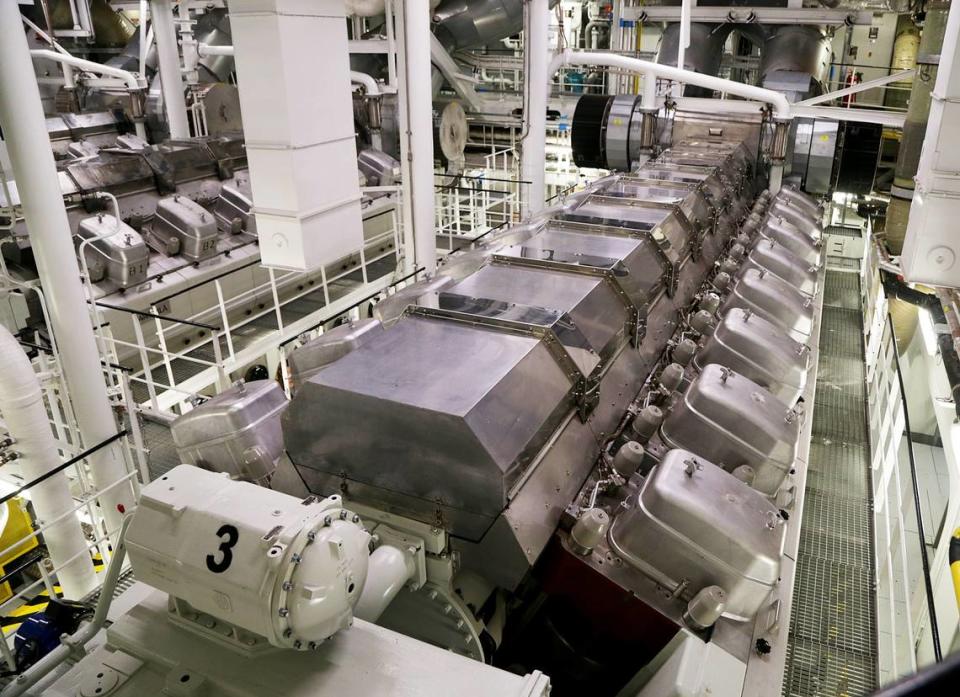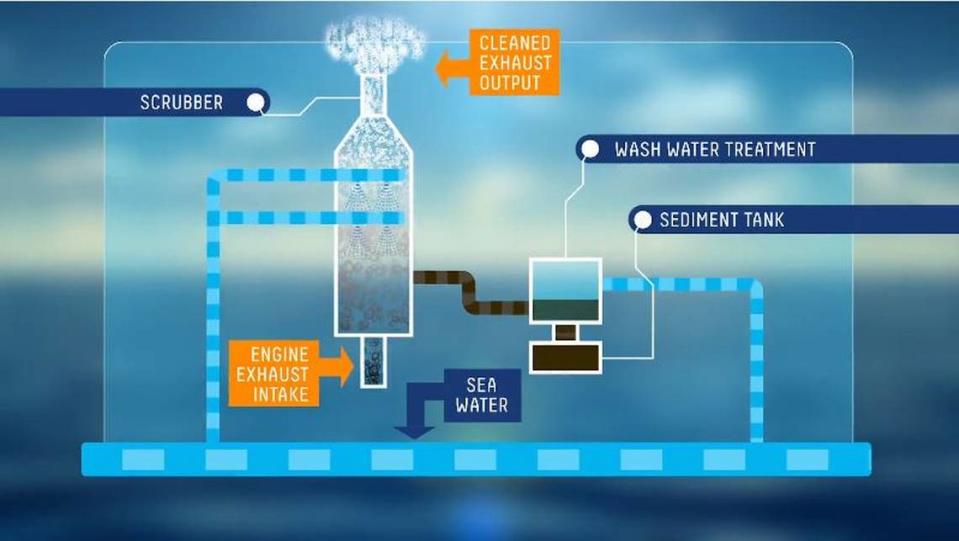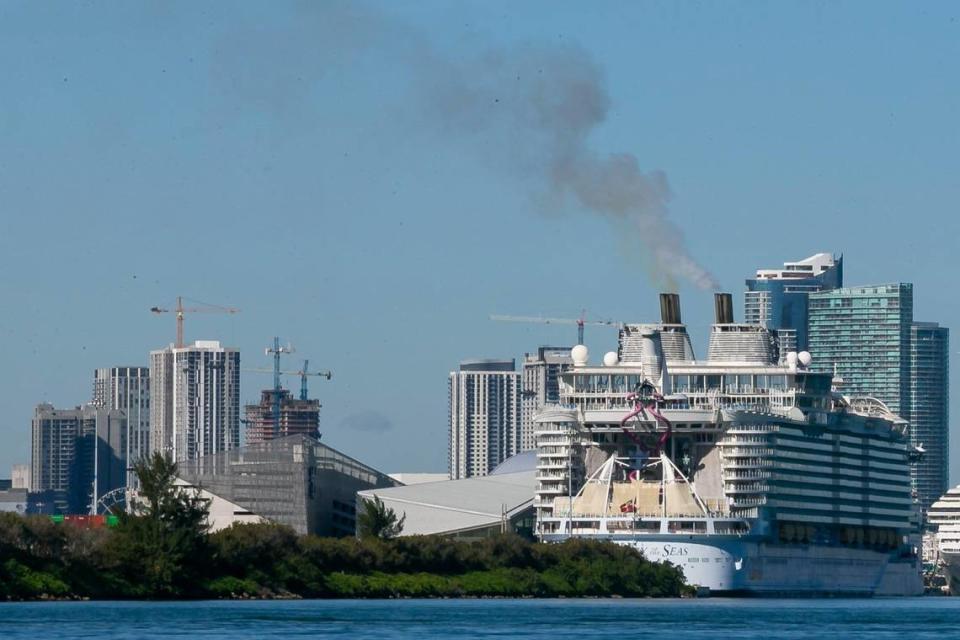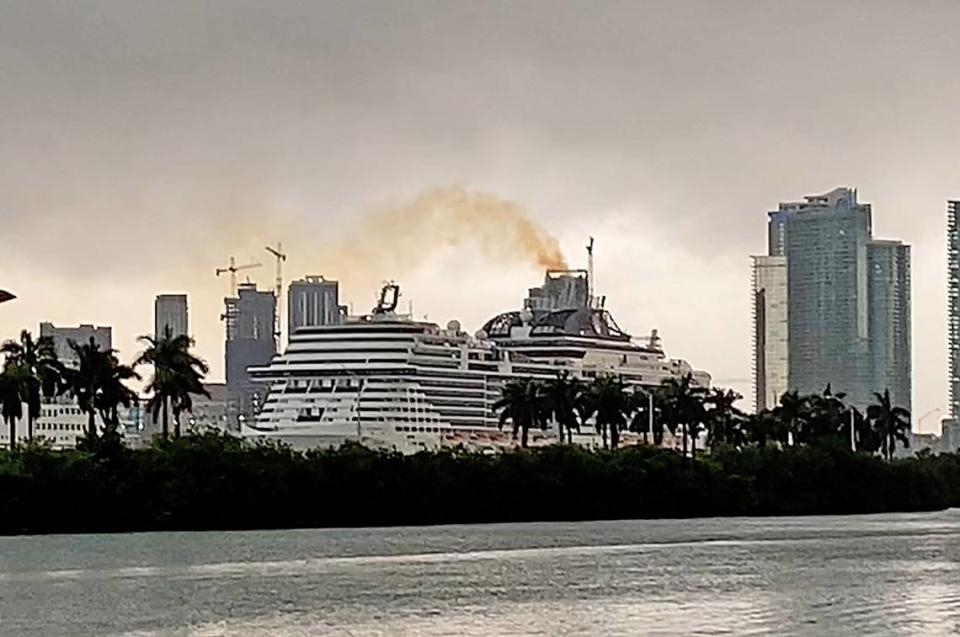Cruise ships’ fix for dirty smoke led to water pollution in South Florida ports, study finds
In an effort to curb their air pollution, cargo and cruise ships have been forced to reduce the sulfur in their emissions since January 2020.
Rather than switching to cleaner-burning fuel, many ships turned to a piece of technology that scrubs some of the pollution out of the exhaust from the fuel — and splashes it back into the ocean.
A new study reveals that ships pour 10 gigatons, or 10 billion metric tons, of that polluted water into the ocean in a year. And Port Everglades, PortMiami and ports in the Caribbean are some of the top dumping grounds.
“This isn’t being distributed in the global ocean, it’s being concentrated in the areas where we’re already concerned about marine life,” said Dan Hubbell, shipping emissions campaign manager for the Ocean Conservancy.
Environmental advocates have long raised the alarm on scrubbers, the machines ships use to suck the sulfur out of their emissions and dump a liquid version of it into the ocean. Since the International Maritime Organization’s new law requiring ships to cut out the sulfur they spew took effect in 2020, instead of switching to low-sulfur fuels, the largest cruise companies have overwhelmingly outfitted their ships with scrubbers as a cheaper solution.

The new study from the non-profit research organization International Council on Clean Transportation attempts to quantify for the first time just how much scrubber wash water is being dumped into the ocean using global shipping traffic data from 2019, ships’ scrubber wash water flow rates and energy demands.
Researchers found cruise ships were the main culprits for discharges in port waters. Georgetown in the Cayman Islands experienced the most scrubber discharges, all by cruise ships, accounting for 14.1% of the total amount discharged in ports. Freeport and Nassau in The Bahamas ranked third and fifth for most scrubber wash water discharges, followed by St. George’s, Grenada, in sixth place. Port Everglades and PortMiami ranked 10th and 11th for most discharges — the most of any ports in U.S. waters.
“This study shows the consequences of regulating pollutants rather than pollution,” said Bryan Comer the head of the ICCT’s marine program. “In its effort to reduce sulfur dioxide emissions, the International Maritime Organization has created a global water pollution problem. Individual countries and ports now must decide whether to allow ships to continue to dump pollution in their waters, without compensation, or to ban the use of scrubbers in their waters.”
‘Minimal impact’ or ‘witch’s cauldron’
Because scrubber technology is relatively new, there’s not a huge body of research showing the potential impact of wash water discharge, but initial studies suggest it could post a significant problem. The IMO is still reviewing scrubber wash water’s effects on the ocean.
Hubbell said there is plenty of research on the individual components in the wash water, which is acidic and contains heavy metals and other toxins, that finds it can harm marine life.

“We already kind of know some of the underlying principles here but it’s just applying it to this new technology,” he said.
A 2020 study by Belgium academics and Port officials found that some scrubbers discharge water that is “acutely toxic” for aquatic organisms, and even when diluted the wash water at the Antwerp harbor docks was still over acceptable levels for some hazardous chemicals. It recommended that scrubber discharge be discouraged in environmentally sensitive areas.
Another recent study from the Swedish Environmental Research Institute also found discharge “highly toxic” to some marine animals. It called the blend of chemicals in scrubber discharge a “witch’s cauldron.”
“It seems that the toxicity cannot be explained by the individual toxic effects of each pollutant but, rather, that the mixing of these pollutants makes scrubber wash water more toxic than the sum of its parts,” Comer said.
In a statement, Cruise Lines International Association, the cruise industry’s lobbying group, pointed to three studies that all found wash water discharge had a “minimal” impact on marine life. One was commissioned from a consultant by CLIA itself, another consultant report was commissioned by Carnival Corporation and the third was commissioned by the Japanese government’s tourism ministry.
Cruise lines have a solution for a new clean fuel regulation. But is it the greenest option?
CLIA noted that scrubber discharge is filtered in an effort to eliminate toxins getting dumped overboard.
Dr. Steve Murawski, a professor of marine ecosystem analysis at the University of South Florida, said even the general acidity of the wash water could be dangerous to marine life.
When the sea gets more acidic, a process known as ocean acidification, it can hurt fish and other sea creatures that depend on building calcium to grow. Climate change is already increasing the rate of ocean acidification around the world.
“Lobsters and crabs and all these other organisms, even fish themselves, use calcium in their physiology. Anything that lowers the pH of the water is going to necessarily be problematic to a set of communities that have adapted over eons,” he said.
Even the IMO’s voluntary guidelines allow wash water that’s more than ten times more acidic than ocean water.

Murawski worked on USF’s response to the Deepwater Horizon oil spill in 2010, and he said the heavy metals found in oil can “bioaccumulate” in fish and other sea life. When predator fish (or people) eat those contaminated organisms, they can absorb those toxic heavy metals too.
“We can’t keep using the ocean as a dump,” he said.
Bans and limits
In recent years governments around the world have taken steps to limit scrubber discharges in waters close to their shores.
In Florida, Port Canaveral and Port Everglades prohibited scrubber wash water discharges last year. The Port of Seattle also banned scrubber wash water discharges from cruise ships last year, citing concerns about the effects on its sensitive marine habitats. Together with Washington’s Department of Ecology and CLIA, the Port of Seattle is considering a proposed ban on cruise scrubber wash water discharge for all of Puget Sound this year.
California and Connecticut require all ships to switch to marine gas oil while operating in their waters and ports to prevent scrubber discharge.

Fifteen countries and territories have banned or put limits on scrubber use in their ports or waters: Bahrain, Belgium, Brazil, China, Egypt, Gibraltar, Ireland, Malaysia, Norway, Pakistan, Panama, Portugal, Singapore, Spain, and United Arab Emirates.
Royal Caribbean, the second-largest cruise company in the world, has a policy of not dumping wash water within three miles of shore. It is the only major cruise line with such a policy.
The study’s authors suggest ports can conduct water testing for the toxins associated with scrubber discharge including acids, Polycyclic aromatic hydrocarbons, heavy metals, nitrates and nitrites. PortMiami did not immediately respond to a request for comment about whether it conducts such testing.
Hubbell recently helmed a report for Ocean Conservancy asking the U.S. to ban scrubbers altogether, both because of their unknown impact on marine life and the fact that they allow ships to continue to use heavy fuel oils, a fossil fuel whose combustion contributes to climate change.
“Rather than pushing us in a direction away from fossil fuels altogether, people are making the decision that’s all about bang for their buck and adds sulfur to the water,” he said. “While it’s treating the air pollution side of things it doesn’t do anything to advance us away from heavy fuel oils. They’re nasty, nasty things.”

